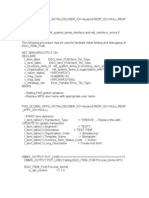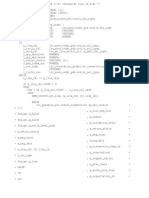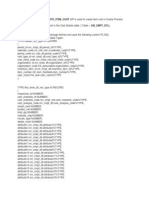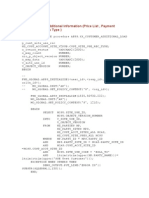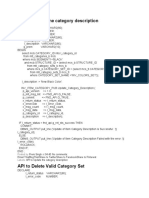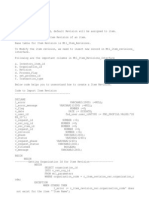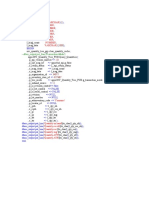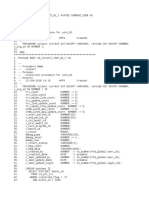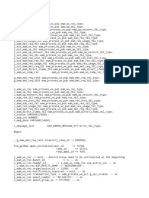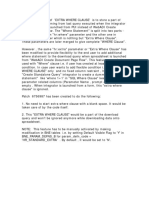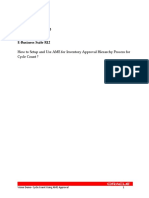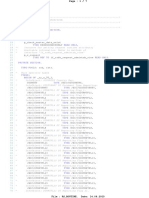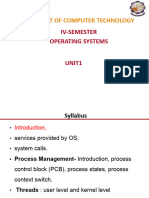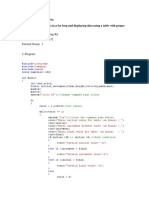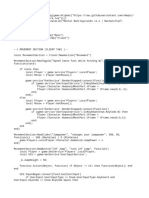API to Create/Update/Delete the System Items and Item Attributes
DECLARE
l_item_tbl_typ ego_item_pub.item_tbl_type;
x_item_tbl_typ ego_item_pub.item_tbl_type;
x_return_status VARCHAR2 (100);
x_msg_count NUMBER;
x_message_list error_handler.error_tbl_type;
BEGIN
fnd_global.apps_initialize (11224
, 20634
, 401
);
l_item_tbl_typ (1).transaction_type := ego_item_pub.g_ttype_update;
l_item_tbl_typ (1).inventory_item_id := 646;
l_item_tbl_typ (1).organization_id := 103;
l_item_tbl_typ (1).pick_components_flag := 'Y';
ego_item_pub.process_items (p_api_version => 1.0
, p_init_msg_list => fnd_api.g_false
, p_commit => fnd_api.g_true
, p_item_tbl => l_item_tbl_typ
, x_item_tbl => x_item_tbl_typ
, p_role_grant_tbl =>
ego_item_pub.g_miss_role_grant_tbl
, x_return_status => x_return_status
, x_msg_count => x_msg_count
);
DBMS_OUTPUT.put_line ('x_return_status : ' || x_return_status);
error_handler.get_message_list (x_message_list);
FOR i IN 1 .. x_message_list.COUNT
LOOP
DBMS_OUTPUT.put_line (x_message_list (i).MESSAGE_TEXT);
END LOOP;
COMMIT;
END;
===============================================================
SET SERVEROUTPUT ON
DECLARE
l_item_tbl_typ ego_item_pub.item_tbl_type;
x_item_table ego_item_pub.item_tbl_type;
x_inventory_item_id
mtl_system_items_b.inventory_item_id%TYPE;
x_organization_id mtl_system_items_b.organization_id
%TYPE;
x_return_status VARCHAR2 (1);
x_msg_count NUMBER (10);
x_msg_data VARCHAR2 (1000);
x_message_list error_handler.error_tbl_type;
BEGIN
--Setting FND global variables.
--Replace MFG user name with appropriate user name.
fnd_global.apps_initialize (11224
, 20634
, 401
);
--FIRST Item definition
� l_item_tbl_typ (1).transaction_type := 'UPDATE'; -- Replace this with 'UPDATE'
for update transaction.
l_item_tbl_typ (1).inventory_item_id := 646;
l_item_tbl_typ (1).organization_id := 103;
l_item_tbl_typ (1).pick_components_flag := 'N';
DBMS_OUTPUT.put_line ('=====================================');
DBMS_OUTPUT.put_line ('Calling EGO_ITEM_PUB.Process_Items API');
ego_item_pub.process_items (p_api_version => 1.0
, p_init_msg_list => fnd_api.g_true
, p_commit => fnd_api.g_true
, p_item_tbl => l_item_tbl_typ
, x_item_tbl => x_item_table
, x_return_status => x_return_status
, x_msg_count => x_msg_count
);
DBMS_OUTPUT.put_line ('==================================');
DBMS_OUTPUT.put_line ('Return Status ==>' || x_return_status);
IF (x_return_status = fnd_api.g_ret_sts_success)
THEN
FOR i IN 1 .. x_item_table.COUNT
LOOP
DBMS_OUTPUT.put_line ('Inventory Item Id :' || TO_CHAR (x_item_table
(i).inventory_item_id));
DBMS_OUTPUT.put_line ('Organization Id :' || TO_CHAR (x_item_table
(i).organization_id));
END LOOP;
ELSE
DBMS_OUTPUT.put_line ('Error Messages :');
error_handler.get_message_list (x_message_list => x_message_list);
FOR i IN 1 .. x_message_list.COUNT
LOOP
DBMS_OUTPUT.put_line (x_message_list (i).MESSAGE_TEXT);
END LOOP;
END IF;
DBMS_OUTPUT.put_line ('==================================');
EXCEPTION
WHEN OTHERS
THEN
DBMS_OUTPUT.put_line ('Exception Occured :');
DBMS_OUTPUT.put_line (SQLCODE || ':' || SQLERRM);
DBMS_OUTPUT.put_line ('=====================================');
END;


